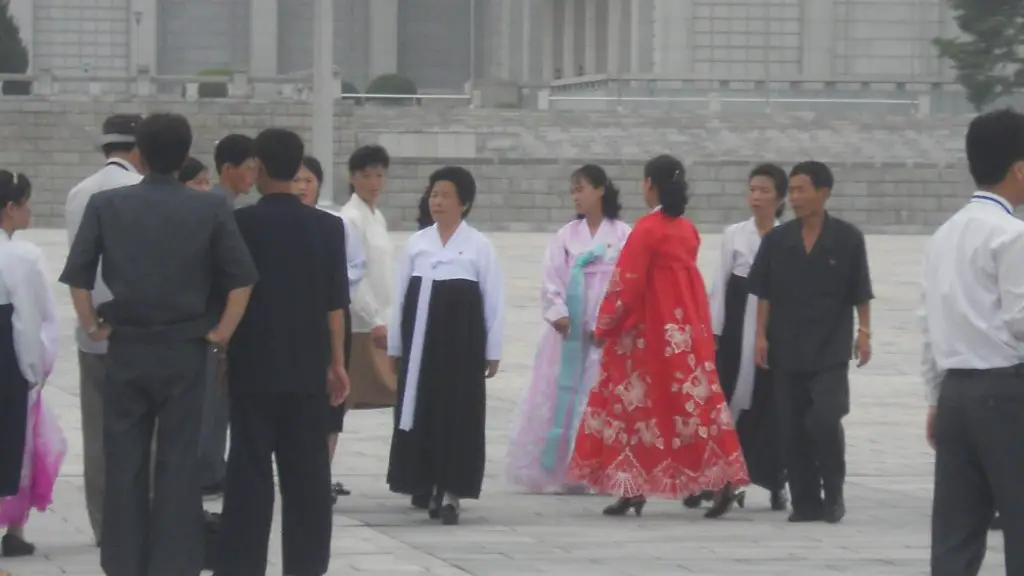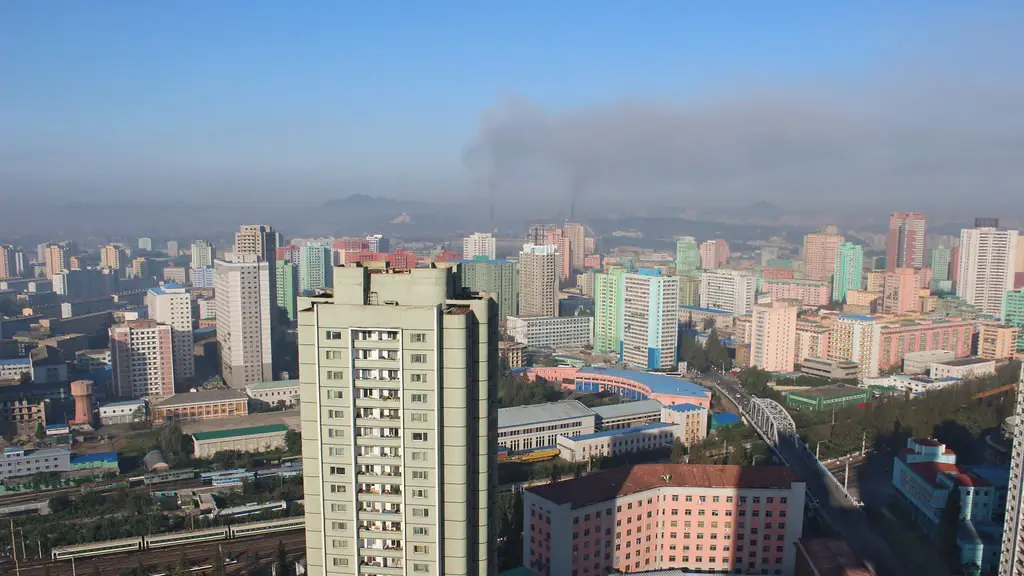Background Information
North Korea is a secretive and isolated country located on the northern half of the Korean Peninsula in eastern Asia. It is a self-declared nuclear state and the only officially Communist state in the world today. Officially known as the Democratic People’s Republic of Korea, the country is led by the country’s “Supreme Leader” Kim Jong Un, the third-generation successor of the family’s communist dynasty.
The Kim family has long been in control of North Korea, with various members of the family monopolizing the position of Supreme Leader since the country’s inception. The late Kim Jong Il assumed the position from his father, Kim Il Sung, who is venerated as the founder of North Korea and is still pandered to today. Kim Jong Un, the current Supreme Leader of North Korea, succeeded his father in 2011 and has since continued the family’s long-held dictatorial rule over the country.
Ruling Style and Strategy
Kim is the principal and figurehead leader of the country and its most important policymaker. He is revered within the country as a symbol of loyalty, patriotism and veneration, leading the government’s absolute and harsh tactics. His style of rule has been described as a “cult of personality”, with posters, images and statues of him being ubiquitous all over North Korea.
Kim’s ruling strategy can be divided into two main strands. He has placed an emphasis on increasing North Korea’s nuclear capabilities, through large military expenditures and testing of various forms of nuclear weaponry over the past decade. This has placed the nation in a precarious but powerful situation, given the diplomatic relations it has with other global superpowers.
The other strand is economic. Kim has placed significant importance on establishing relationships with the outside world and encouraging economic policies that could bring the country greater wealth. The country has engaged in various joint economic projects with Russia and China, for example, with both countries granting economic concessions and investments to North Korea.
Military Support
Kim has placed significant focus on maintaining a strong and dedicated army. The military is seen as the primary protector of the country’s interests and most strategic assets, and they are represented all over the country in various roles, especially at the higher levels of government. Military personnel frequently occupy influential roles in the government, reinforcing the country’s policy of absolute military supremacy.
The military is also the main source of Kim’s authority and power. Through his military supporters and alliances, Kim has been able to present a unified national front and provide a powerful deterrent to any outside influence or attempts to attack the country.
International Relations
During his tenure as Supreme Leader, Kim has sought to strengthen and improve North Korea’s relations with the international community. He proclaimed his nation’s readiness to engage in dialogue and negotiations with other nations and organizations, including South Korea, the United States and the United Nations.
This has yielded some positive results, with North Korea engaging in various bilateral and multilateral talks with other world powers. He has also extended diplomatic overtures to South Korea, reaching out to its president Moon Jae-in and discussing a potential reunification of the two, formerly divided, Koreas.
Military Spending
As part of his commitment to military supremacy, Kim has placed significant emphasis on maintaining and modernizing the nation’s military capabilities. The country is home to a large army of both military personnel and weapons, and it has been estimated that a sizable portion of North Korea’s GDP is devoted to the military.
The country has continually sought access to new technology and advanced weaponry from abroad, often using its relationships with other world powers to its advantage. Many of these efforts have been met with international condemnation and further economic sanctions against North Korea, further exacerbating the country’s dire economic situation.
Economic Policy and Impact
Kim has placed significant emphasis on improving North Korea’s economic situation, with his main focus being on restoring normalcy and stability to the country. Under his rule, the nation has implemented various reforms aimed at liberalizing its economy, such as the adoption of new currencies, the abolition of the free market, and the increased availability of foreign goods.
These policies have had a mixed impact on the country’s economic situation. Whilst some positive benefits have been realized in the form of increased foreign investment and access to resources and technology, the nation’s poverty rate has also grown significantly, with the United Nations estimating that 16 million people in the country are living in poverty as a result of these policies.
Assessment of Effectiveness
Kim’s tenure as Supreme Leader of North Korea has been a turbulent one. His efforts to strengthen the nation’s diplomatic and economic position have yielded some success, but many of his other policies have been met with international condemnation and generated internal strife.
As a result, it is difficult to assess Kim’s effectiveness as a leader. On one hand, he has made great strides in solidifying North Korea’s position as a nuclear power, and he has sought improved relations with South Korea and other world powers. On the other hand, his economic and military policies have had an overwhelmingly negative effect on the country’s economy, leading to increased poverty and political unrest.
Internal Conflict and Unrest
Kim Jong Un has presided over an increasingly chaotic and repressive society during his tenure. His rule has been marked by numerous instances of racial and political persecution, media censorship, and the suppression of dissent. This has created an environment of fear and distrust amongst North Koreans, with many fleeing the country in search of a better life.
With instances of political unrest and dissent increasing, as well as growing tensions between North and South Korea, it is clear that Kim Jong Un’s rule has not been a stabilizing force for the country. This has led to increased international scrutiny and condemnation of the country’s human rights record and has exacerbated existing economic and diplomatic relations.
International Pressure and Opprobrium
Since the assumption of power by Kim Jong Un, North Korea has become increasingly isolated from the international community. Its nuclear ambitions and refusal to adhere to international regulations have been met with several waves of international sanctions and condemnation.
The United Nations and other global powers have led the charge in trying to reach a diplomatic solution to the standoff between North Korea and the rest of the world, with a number of talks and negotiations being held to try and defuse the tension between the two sides. However, as of yet, these talks have been largely unsuccessful, and the country remains essentially isolated and cut off from the rest of the world.
Human Rights and Criticism
Kim’s rule has been marked by the increasing curtailment of civil liberties and human rights violations. The government has been criticized for its use of torture, arbitrary arrests, and extrajudicial killings in its efforts to maintain “absolute control” over the country.
The United Nations has condemned these practices, with numerous reports and investigations into the country’s human rights record being undertaken. Despite these measures, Kim Jong Un has remained in control and has continued to preside over what can only be described as a regime of oppression, with no end in sight.


